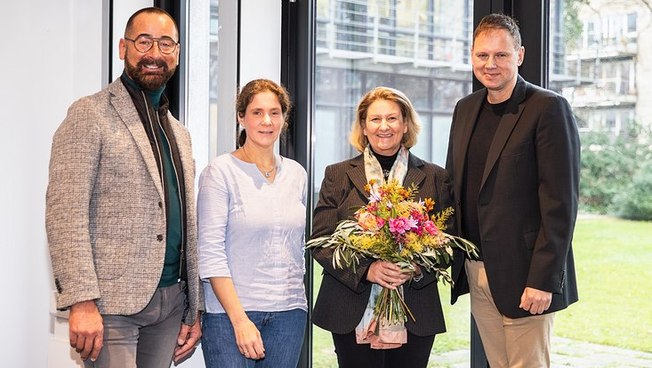5 March 2024
Research on social dimensions of climate research and resilienceUNESCO Chair Launched in Hamburg

Photo: UHH/Göttling
“Climate change threatens our coexistence on this planet,” says Prof. Dr. Maria Böhmer, president of the German Commission for UNESCO. “We need more than technology to tackle this problem and must appreciate climate protection as a collective responsibility. I am delighted that in Hamburg excellent researchers will henceforth address this issue within the international alliance of UNESCO Chairs. This marks a further step towards meeting the United Nations’ global goals.”
Climate action builds on combining sustainability questions, adaptation strategies, and disaster preparedness. Regional and cultural differences define how people and communities meet climate change challenges. The new chair aims to shed light on the various roots of human resilience as a basis for climate protection measures. The researchers’ primary focus is on small islands in the Caribbean, the Indian Ocean, the Pacific, North America, and Europe, which are particularly impacted by climate change.
“We must turn knowledge into action. I specifically aim to advocate action,” says geographer Professor Dr. Beate Ratter, who holds the new Chair for Societal Climate Research and Resilience. “My focus is on small islands. Based on the needs and problems of local populations I will promote the experience of personal action. In the long run, this can lay the foundation for a self-determined and sustainable response to climate change challenges,” says Ratter. “UNESCO is a fascinating peace organization, which fosters knowledge, justice, education, culture, empowerment, and equality. The UNESCO Chairs correspondingly provide diverse expertise, which I hope to link up for topics in climate adaptation. Climate change is not just an isolated phenomenon, it affects all aspects of our life now and in future.”
Since 2017, Beate Ratter has been a professor of integrative geography and coastal research at Universität Hamburg’s Cluster of Excellence Climate, Climatic Change, and Society (CLICCS). Furthermore, she is head of Human Dimensions of Coastal Areas at the Helmholtz-Zentrum Hereon’s Institute of Coastal Systems in Geesthacht.
“I congratulate Prof. Beate Ratter on behalf of the entire University on this honor,“ says Prof. Dr. Hauke Heekeren, president of Universität Hamburg. “We are delighted that the Chair for Societal Climate Research and Resilience will be based at Universität Hamburg. Research into human-ecosystem relations and social prerequisites for a permanent decarbonization are also focus areas of our Cluster of Excellence CLICCS, which addresses related questions.”
Visit the UNESCO webpages for details about the UNESCO Chairs program. Find an interview with Prof. Dr. Beate Ratter on the CLICCS webpages.
Background
Over 900 UNESCO Chairs in more than 110 countries form a global cooperation network to firmly establish UNESCO’s goals in research and education. Germany now has 17 UNESCO Chairs, all characterized by outstanding research and teaching in UNESCO focus areas. International networking—in particular between and within the northern and southern hemispheres—and the promotion of transcultural dialogue are key to their work. The world over, UNESCO Chairs help build, spread, and use knowledge to boost sustainable development.
